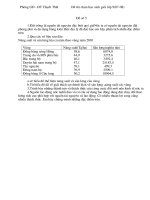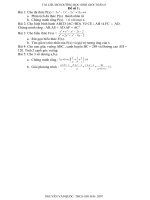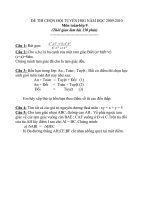DỀ THI CHỌN HSG HUYỆN AV9 (số 21)
Bạn đang xem bản rút gọn của tài liệu. Xem và tải ngay bản đầy đủ của tài liệu tại đây (99.33 KB, 3 trang )
ĐỀ SỐ 17:
Đề thi
Chọn đội tuyển đi thi học hsg cấp huyện lớp 9 THCS
Năm học:
Môn tiếng anh
Thời gian làm bài: 150 phút ( Không kể thời gian giao đề )
Question 1: Supply the correct form of the verb in brackets.
1. What you ( do )……………. after you ( go )…………… home yesterday?
2. Before leaving home in the morning, she (tell)…………… her mother she (work)…………
in the factory that afternoon.
3. I realised that someone ( steal )……… my wallet when I ( feel )……….… his hand in my
pocket.
4. She (be)………… here but she (go)……… down with flu.
5. Bill (have)………… breakfast when I (stop) …………at his house this morning.
Question 2:
a. In each sentence has one mistake, find and correct it.
1. No matter how hard his life be, he is determined to study well.
…………………………………………………………….
2. Could you mind telling me the way to the nearest restaurant?
…………………………………………………………….
3. Travelling by air is preferable than travelling by train.
…………………………………………………………….
4. She is looking forward to go to Europe after she finishes her studies at the university.
…………………………………………………………….
5. Sorry, I seem to have taken the wrong umbrella for mistake.
…………………………………………………………….
b. Fill each blank with the appropriate form of the word given in brackets.
1. Every year we celebrate our ………… … . (depend)
2. There’s no ………….… service in the United Kingdom. ( nation)
3. The temperature is very ……….… at this time of the year. (vary)
4. He gets very angry if you ……… … with his ideas. (agree)
5. She smiles so …………… , doesn’t she? (attract)
Question 3: Fill each of the blank with the most suitable preposition.
1. Students were angry …………. being treated like children.
2. They export their products ………. markets ……… … the world.
3. I am extremely grateful …….… all the teachers ………… their help.
4. She went to London …… …. the aim ……… … finding a job.
5. He’s sitting …….the chair … ….… to the piano.
6. She suffers ….… a lack of confidence.
Question 4: Fill each of the numbered blanks in the following passage. Use only ONE word
in each space.
Food plays an(1)……… part in the development of nations. In countries where food is
(2)………… , people have to spend most of their time getting enough to eat. This usually
slows down(3)……… , because men have little time to (4)…. ……… to science, industry,
government, and art. In nations where food is(5)…………. and easy to get, men have more
time to spend in activities that(6)…… …. to progress, and enjoyment of leisure. The problem
of (7)….………. good food for everybody has not yet been solved. Many wars have been(8)….
….…. for food. But it is no longer necessary to go to war for food . Nations are beginning to
put scientific knowledge to work for a(9)…… …… of their food problems. They work
together in the Food and Agriculture Organization of the United Nations (FAO) to help hungry
nations(10)……. …… more food.
Question 5: Read the text and choose the correct word for each space:
ENGLISH AROUND THE WORLD
English is the first language of many people in countries outside the United Kingdom.
When you(1)…… speakers of English from around the world, you(2)…. . notice that they do
not all speak in the same way. There are also some(3). in the words they use, including the
names of(4)…. objects that are part of everyone’s daily life. But although pronunciation and
(5)… are not the same everywhere, it is interesting that English speakers(6)……. opposite
sides of the world can understand(7)……. other quite easily. It does not seem to(8).…
where they learnt the language. And of course this is one reason why speakers of other
languages are keen (9)…… learning English too. If you know English, you are more(10)
…… to be able to study or work in all sorts of exciting places, such as the United States or
Australia.
1. A- recognise B- meet C- find D- attend
2. A- originally B- strangely C- curiously D- immediately
3. A- mistakes B- corrections C- changes D- differences
4. A- common B- popular C- favourite D- general
5. A- reading B- composition C- dictation D- vocabulary
6. A- of B- in C- from D- at
7. A- each B- one C- the D- some
8. A- mine B- care C- matter D- worry
9. A- by B- on C- to D- for
10. A- likely B- probably C- possibly D- luckily
Question 6: a. Finish each of the following sentences in such a way that it means exactly the
same
as the sentence printed before it.
1. I’m sure he was at home last night.
He
2. Nam’s parents were here last week and gave us a present.
Nam’s parents,
3. Although Sue felt tired, she stayed up late talking to Jill.
Despite
4. It was a hot day so we had lunch outside in the garden.
It was such
5. I’ve been working for this company for ten years.
I started
b. Make one sentence from each group of sentences, beginning as shown.
1. I lent you a book. It was written by a friend of mine. She lives in France.
The book I … …………………………………………………………
2. I used to own a dog. People came to the door. The dog never barked at them.
The dog… …………………………………………………………………
3. I bought my car from a woman. She lives in a house. You can see the house over there.
The woman I …………………………………………………………………
4. My friend Bill has decided to buy a motor-bike. His car was stolen last week.
My friend Bill,………………………………………………………………………
5. I bought a new car. It cost me a lot of money.
The new …………………………………………………………………………….









